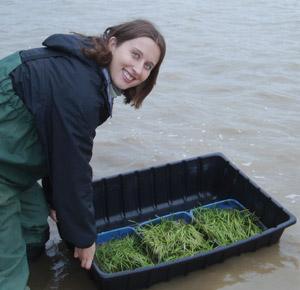The Ripple Effect
Environmental optimist Joanna Cornell believes a simple nature walk can change the way you see the world
By Tara Laskowski, MFA ’06

Joanna Cornell with submerged aquatic vegetation (SAV)
One stone thrown into a large lake might not seem significant, but the ripples that form from that one action expand outward and onward.
That’s what Joanna Cornell, PhD Environmental Science and Policy ’07, hopes to convey to the people of Northern Virginia: one small, seemingly insignificant, action can make a positive difference.
With her catchy, upbeat attitude toward the environment, Cornell created the NEST (Neighborhood Ecological Stewardship Training) Program to attract people to the natural environment around them in new and intriguing ways. The concept is simple: get adults outside, learning about the water, land, and animals around them so that they care and want to take small individual actions to help keep our world protected and valued.
The program uses art and science programs to introduce participants to watershed and stream ecology, soil, and native and invasive plants. From painting pictures with soil-based paint to hiking for wildflowers, participants in the NEST Program have one eye-opening experience after another and right in their own backyards.
“The important thing is that it is a positive program,” says Cornell. “Too often information about the environment is depressing and frightening. People shut down because it sounds too doomsday. But with NEST, instead of scaring people, we inspire them to care.”
Cornell, an aquatic and human ecologist at the Northern Virginia Soil and Water Conservation District, came up with the idea for NEST when she was thinking about a project for her doctoral dissertation. She realized that improvements and action for the environment cannot be accomplished by government regulation alone—daily human actions need to be integrated into the solution.
More than 175 adults of all backgrounds and ages participated in the first NEST series—experienced outdoorsmen ready for anything and novices who had never even taken a nature walk.
“I wanted people to explore their ‘nest,’ to look at where they live in a new way and begin to view it as a community,” says Cornell. “The more people become engaged in the environment around them, the more motivated they are to take action to save it.”
For example, one of the land-based exploration programs was about bats. Participants went to a local park—one they might bring their kids to play in during the day—and waited for darkness to fall. They then observed thousands of bats emerge from their bat houses to search out dinner.
“Everyone could see the surroundings as a natural habitat,” says Cornell. “It was like going on a minisafari.”
More than 40 nonprofit organizations, agencies, and private businesses contributed supplies, programs, and other help. This astonishing level of giving made NEST unique in that it was free to all participants.
After the first NEST series was completed in spring 2006, Cornell used surveys to assess the program’s affect on participants’ environmental attitudes, knowledge, and behaviors. Her research showed that an experiential program such as NEST can change how people think about themselves in relation to their environment and influence environmental attitudes, knowledge, and, most important, behavior. She discovered that many of the participants continue environmental activist work after graduating from NEST.
Cornell is coordinating a new NEST series with the Northern Virginia Soil and Water Conservation District for spring 2008. She hopes to add several new components to the list of activities, such as history and personal health and physical fitness. She also incorporates a mini-NEST into the Introduction to Conservation Studies course she teaches at Mason.
“The future is limitless with a program like this,” she says. For more information about the upcoming series, contact Cornell at [email protected].

